10 Greatest Roman Emperors and Their Achievements
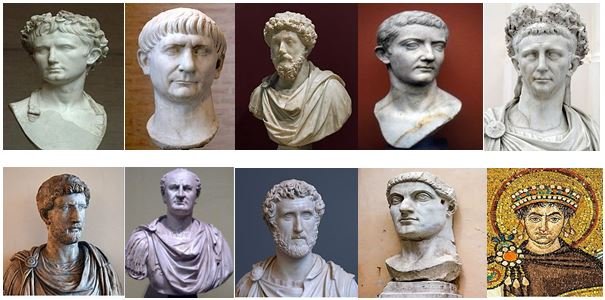
Greatest Roman Emperors in History
The Roman Empire, as it was called after the demise of the Roman Republic, had a new genre of very famous and great rulers called Emperors. These Emperors were chosen on the merit of their control and handling of their armies and the approval of the Senate in Rome. The usual procedure that qualified one for such a high office was either his ability to manage large armies or the number of royal titles bestowed on him by the Senate.
People of high-standing status in the society that met the above two criteria had a pretty good chance of becoming emperor. Considering the fact that the Roman Empire spanned vast portions of the earth for the better part of four hundred years (27 BC to 476 AD), which was then followed by the Eastern Roman Empire (5th century to 15th century AD), so many emperors ruled to varying degrees of success and failures.
In the article below, we present the life stories of the 10 Greatest Roman Emperors and their respective accomplishments:
Emperor Augustus

Emperor Augustus (reign – 27 BC to 14 AD)
Augustus was the first emperor of the Roman Empire (an empire that he founded) whose 40-year reign (from 27 BC to 14 AD) helped form the backbone of an empire that would go on to last for close to 1500 years.
Named Octavian at birth, he was bestowed the new name Augustus, an honor accorded him by the Senate of the day in honor of his great accomplishments.
Augustus saw to it that he avenged the assassination of his adoptive father Julius Caesar with the help of Mark Antony. This uneasy alliance occurred before the two had a misunderstanding and went their separate ways.
Another achievement that Emperor Augustus chalked came when he defeated Mark Antony and Queen Cleopatra of Egypt. After the monumental win, he tasked the Senate to draw up a fresh constitution for the Roman Empire. This effectively made him the sole ruler of the Roman Empire.
Emperor Augustus reign, though not totally devoid of wars due to expansion at the frontiers and civil war, enjoyed relative peace that was dubbed “Pax Romana”, meaning the Roman Peace. He was largely found to be an astute ruler who spearheaded several developmental works such as the construction of roads, aqueducts and many buildings.
Not only was Augustus the first emperor, but he is largely acclaimed as one of the best rulers of ancient times. And shortly after his death, the Senate eulogized him in a god-like manner. The sheer amount of work that Emperor Augustus did enabled him to earn a lasting place in history.
Emperor Marcus Aurelius
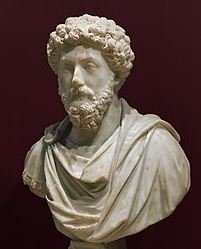
Greatest Roman Emperors | Emperor Marcus Aurelius (r. 161 AD to 180 AD) was a renowned Stoic philosopher.
Marcus Aurelius was a very influential emperor of Rome. He was a devoted Stoic philosopher and was widely acclaimed to be the very last in the list of five good Roman Emperors. His reign covered 19 years, between 161 AD and 180 AD.
During his tenure as Roman Emperor, he handed the revamped East European Parthian Empire a very painful defeat during the Parthian War (161-166 AD). Then the Marcomanni, the Quadi, and the Sarmatians also fell to his astute military skills during the Marcomannic Wars fought in Central Europe.
As all of these victories were being chalked, the Germanic Tribes constantly proved to be a serious threat looming on the horizon. With war and threats of war on almost all sides, an uprising spearheaded by Avidius Cassius was quickly brought under control by Emperor Aurelius.
Emperor Marcus Aurelius was a brilliant philosopher and writer. Well versed in stoic philosophy, the great Marcus Aurelius’ book titled Meditations was written while on a military campaign trail between the years 170 to 180 AD. Written in the Greek language, this particular piece of writing is still held in high regard as a great philosophical literary work. This book does not only teach the importance of service and duty; however, it also focuses on how to remain in a harmonious state even in the state of persecution, tribulations or war. Aurelius entreats us to focus on nature and dwell on the good that nature has to offer.
As a result of all his resounding philosophies, Aurelius was nicknamed The Philosopher King during his lifetime, a name that remained even after his death when he was referred to as The Philosopher.
Emperor Trajan

Emperor Trajan (reign: 98 – 117 AD).
Named Optimus Princeps (meaning, the best ruler), Trajan ruled as emperor of the Roman Empire from 98 AD to 117 AD.
Emperor Trajan won the hearts of all and sundry because of his people-friendly welfare system which greatly endeared him to the lower class of society.
Being both a military man and emperor, he headed many incursions into other territories, thus expanding the empire greatly. The Senate cannot be left out of his list of admirers. He was greatly respected across the board.

A best wish that was often said to a newly crowned Roman emperor
Trajan’s good reputation has easily endured the test of time. He is part of the Five Good Emperors who ruled Rome between the 1st century and the 2nd century AD. These emperors (Nerva, Trajan, Hadrian, Antonius Pius, and Marcus Aurelius) ruled with a steady, just, competent and virtuous hand. By so doing, they ushered in the golden age of Rome.
Emperor Tiberius

Greatest Roman Emperors | Emperor Tiberus (r. 14 to 37 AD)
Tiberius Claudius Nero was Emperor of Rome from 14 to 37 AD. His mother’s name was Livia Drusilla, who became the wife of Emperor Augustus in the year 39 BC. This marriage made him the stepson of Augustus.
Tiberius was later adopted by his stepfather Augustus as his heir, an event that caused his name to be changed to Tiberius Julius Caesar. This title became the name by which emperors that followed him took.
Living up to the reputation, Tiberius was one of the most astute Roman generals of his time, conquering Pannonia, Dalmatia, Raetia, and for a while, some parts of Germania. These conquests paved the way for the institution of the northern frontier.
Character-wise, Tiberius was judged to be a brooding, reclusive, and serious emperor with no real desire to be a ruler.
At his demise, Tiberius left behind nearly three billion sesterces in the imperial treasury. This emperor chose to build more bases and preferred diplomacy to war. This new approach, rather than make Rome weaker, made it stronger and more unified. One would wonder why then Roman historians gave such a negative impression of him. It is believed that should Tiberius have died before the Purge in 23 AD, he would have been remembered as a truly great emperor.
Emperor Hadrian

Greatest Roman Emperors | Emperor Publius Aelius Hadrianus
Born of ethnic Italian parentage, Publius Aelius Hadrianus became Emperor of Rome between 117 and 138 AD. Prior to Trajan’s death, the wife of Trajan declared Hadrian the next emperor. Historians believe that Trajan had never officially declared him as his heir apparent.
As emperor, Hadrian visited almost all the provinces under his rule, thus connecting to the locals in a hands-on approach.
Because of his admiration for Greece, he endeavored to revive Greek architecture to its former glory. Hadrian rebuilt the Pantheon. He was also involved in the building of the Temple of Venus and the god Roma, and the Hadrian’s Wall. The wall marked the northern boundary of Roman Britain.
Desiring to have an army that is always ready for battle, Hadrian spent a great deal of his reign with his soldiers. He usually donned military apparel and many times was found eating together with his soldiers. He was known to raise false alarms sometimes to test the army’s alertness and readiness in cases of a surprise enemy attack.
Due to his great efforts and good reputation as an excellent military administrator, there were very few crisis situations and major conflicts during his reign. The only exception worth noting was the Second Roman-Jewish war, which he handled very cleverly.
Emperor Claudius
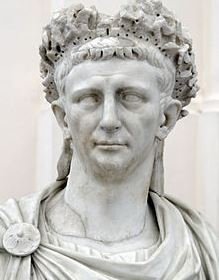
Greatest Roman Emperors | Emperor Claudius reigned from 41 AD to 54 AD
Claudius was among the first Roman emperors born outside of Italy. He reigned as emperor for thirteen years, from 41 AD to 54 AD. He was born to Drusus and Antonia Minor. Because he had a limp and was slightly deaf, he was neglected by family members and was not allowed to join in public office until he became consul. These perceived misfortunes ended up saving his life during the purge as his real and perceived enemies did not see him as much of a threat, unlike Tiberius and Caligula.
His physical challenges were unacceptable to the nobility as well as the Senate, causing them to vehemently oppose him being their emperor. Surprisingly, his largest support base came from the military.
Claudius was a mixture of characteristics; he was absent-minded most times. He would hesitate to take major decisions, unkind to the point of cruelty. However, he was intuitive and wise. Unfortunately, his wife and personal staff dominated him.
Despite all these drawbacks, Claudius was very efficient at his work as an administrator. He had a big vision and accomplished it by embarking on ambitious building projects such as new roads and aqueducts. He also built canals all across the Roman Empire. It was also during his reign that the emperor initiated the conquest over Britain.
With his interest in academic excellence, he turned to the law and presided over public trials, issuing no less than twenty edicts a day.
Emperor Vespasian

Greatest Roman Emperors | Emperor Vespasian
During his rule of 10 years, Vespasian was faced with one of the most difficult eras in Roman history. This period was when the empire was regaining a semblance of normalcy after the mayhem caused by disastrous reigns of emperors like Nero and Caligula. These aside, the empire had just seen a civil war in which the empire had four emperors in the period of only one year.
A realist, and an accomplished general, Vespasian proved himself convincingly in the fray of battle. He was also confronted by an uphill task of returning balance to the Roman Empire. His prolific reign that lasted from 69 to 79 AD earned him respect and the honor of being amongst the greatest Roman Emperors.
During Emperor Vespasian’s reign, public funds were lavishly disbursed for public works meant to restore and beautify Rome to its former glory. Vespasian also commissioned construction work on the Temple of Peace, a good number of modern public baths and most ambitious of all, the majestic structure of the Colosseum. Unfortunately, he did not live long enough to see it in its completed splendor, as he died before its completion.
After Vespasian died in 79 AD, his eldest son, Titus, succeeded him. This made Vespasian the first Roman emperor to be automatically succeeded by his biological son. This succession commenced the Flavian dynasty (69-96 AD) that held the reins of power in Rome for the period of 27 years.
Emperor Antoninus Pius

Antoninus Pius (reign- 86 AD to 161 AD)
Antoninus Pius ruled the Roman Empire from 138 to 161 AD. He was adopted by Emperor Hadrian and became his successor after Hadrian died.
The first decree he made when he became emperor was to honor former emperor Hadrian. After this act, Antoninus also adopted his successor, Marcus Aurelius, as his son. His reign was a very peaceful one and there are no existing records of significant military maneuvers in his time.
A lover of Roman arts, Antoninus constructed temples, theaters, mausoleums, and promoted the arts and science. He also honored and granted financial rewards to deserving teachers of rhetoric and philosophy.
Antoninus was the most outstanding among all the Roman Emperors. This is because he handled crises without having to travel out of Italy at any time.
This diplomatic style of governance was very much admired by his peers and subjects for generations after his reign.
Emperor Justinian

Basilica of San Vitale Mosaic painting of Emperor Justinian (reign from 482 AD to 565 AD), also known as Saint Justinian the Great
Nicknamed “The Last Roman” by modern historians, Justinian I was the last Roman Emperor of an empire that had been divided by war. By the year 476 AD, the Western part of the empire had been overrun by the barbarians, leaving him emperor only of the Eastern part of the empire, (the Byzantine Empire) from 526 to 565 AD.
Emperor Justinian during his tenure fought to bring back the splendor of the great Roman Empire and reclaim the lost western half. His great army generals Belisarius and Narses conquered and took back many parts of the empire, even the city of Rome.
Justinian was well known for spearheading the Justinian Code. The code was to become a unified code of law that had its basis on some vital laid-down Roman laws. Over the centuries, the Justinian Code has become the underlying basis of the universal systems of law accepted in the Western world.
Not to be left out, Justinian oversaw the erection of grand buildings in Constantinople the most notable of them being the Church of Hagia Sophia, which sits next to another spectacular building, the Blue Mosque in Istanbul, Turkey. The Hagia Sophia became the epitome of Eastern Orthodox Christianity and Byzantine architecture for centuries to come.
A debilitating outbreak of the bubonic plague in 540 AD brought about the irreversible down slide of the Roman Empire.
In conclusion, it is worthy of note that many famous and infamous emperors came and went. The worst of them on the record being Caligula and Nero, whose reigns led to great suffering and strife. Others contributed positively to the building of this great empire; the greatest of these noble gentlemen being Julius Caesar. Just by strategically controlling both state and the Senate, he set into motion a series of events that culminated in the formation of the great Roman Empire.
Read More: Major Achievements of Empress Theodora, wife of Emperor Justinian
Constantine the Great
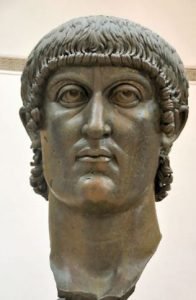
Greatest Roman Emperors | Constantine the Great (reign from 272 AD to 337 AD)
This famous emperor, Flavius Valerius Aurelius Constantinus Augustus became the foremost Christian emperor in Roman history. He was chronicled as a leader of great historical importance.
Under Constantine’s rule, the divided empire was reunited under his sole supervision, thus enabling the empire to score major victories against strong foes such as the Franks, Alemanni, Goths, and Sarmatians. He grew so strong that he reoccupied some previously lost Roman provinces.
Constantine founded a capital city which he named Constantinople, after himself. Constantinople (modern Istanbul) grew to become the capital city of the Byzantine Empire for centuries. Due to all of these achievements, Constantine became known as the founder of that empire.

Being the first Christian emperor, he quickly became an integral part of Christian history in the Roman Empire. It was Constantine who commissioned the construction of the Church of the Holy Sepulchre at the believed burial site of Jesus Christ in Jerusalem and it became the holiest church in Christendom.
Emperor Constantine’s conversion to Christianity had a far-reaching impact in the Byzantine Empire, making Christianity the religion of the empire.
Why did Roman Emperor Constantine the Great convert to Christianity?

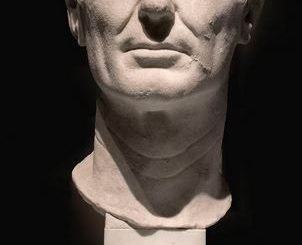


























leave off Tiberius, put in Aurelian